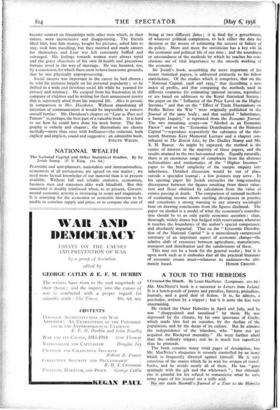NATIONAL WEALTH
The National Capital and Other Statistical Studies. By Sir Josiah Stamp. (P. S. King. los. 6d.)
PLANNERS and anti-planners, nationalists and internationalists, economists of all persuasions, are agreed on one matter ; we need more factual knowledge of our material than is at present available. Without full and reliable statistics, economists, business men and statesmen alike walk blindfold. But this unanimity is doubly reinforced when, as at present, Govern- mental economic activity is increasing in scope and magnitude. It is annoying for the economist or economic historian to be unable to correlate supply and price, or to compare the cost of living ar.two different dates ; - it i fatal -for a goverffnienti of whatever political- eoriiplexion, to lack either the data for decision or the means of estimating the success or failure of its policy. More and more the statistician has a key role in the economic and political life of our time ; and the soundness or unsoundness of the methods by which he reaches his con- clusions are of vital importance to the smooth working of the economy.
Sir Josiah's book, assembling the more important of his recent statistical papers, is addressed primarily to his fellow statisticians. Of the studies which it comprises, that on the "National Capital, 1928 and 1935," that describing a new index of profits, and that comparing the methods_ used in different countries for estimating national income, reproduce or are based on addresses to the Royal Statistical Society ; the paper on the "Influence of the Price Level on the Higher Incomes" and that on the "Effect of Trade Fluctuations on Profits Before the War" were originally published in the Journal of the same body ; and that entitled "Inheritance, a Sample Inquiry," is reprinted from the Economic Journal. The two remaining essays—on "Alcohol as an Economic Factor" and on the "Economic Distribution of the National Capital "—reproduce respectively the substance of the thir- teenth Norman Kerr Memorial Lecture and a chapter con- tributed to The British Isles, by Dr. Dudley Stamp and Mr. S. H. Beaver. As might be expected, the method is the centre of interest in the majority of these papers, and the results attained in the two last-named only. Equally haturally, there is an enormous range of complexity from the abstruse technicalities and mathematics of the "Higher Incomes" paper to the brief simplicity of the sample enquiry into inheritance. Detailed discussion would be out of place outside a specialist journal ; a few pointers may serve. In his opening paper Sir Josiah reconciles the long-standing discrepancy between the figures resulting from direct valua- tion and those obtained by calculation from the value of estates passing at death. The comparison of national methods of estimating income shows startling divergences in practice and constitutes a strong warning to any unwary sociologist bent on drawing conclusions from the figures disclosed. The paper on alcohol is a model of what the economises contribu- tion should be to an Only partly economic question : clear, thorough, widely drawn but hedged with reservations wherever it touches the boundaries of the author's special competence, and absolutely impartial. That on the "Economic Distribu- tion of the National Capital" is a miraculously compressed summary of an important aspect of economic change—the relative shift of resources between agriculture, manufacture, transport and distribution and the subdivisions of these.
This may not be a book for the general reader ; but it is upon work such as it embodies that all the practical literature of economic events must—whatever its audience—be ulti-


































































 Previous page
Previous page